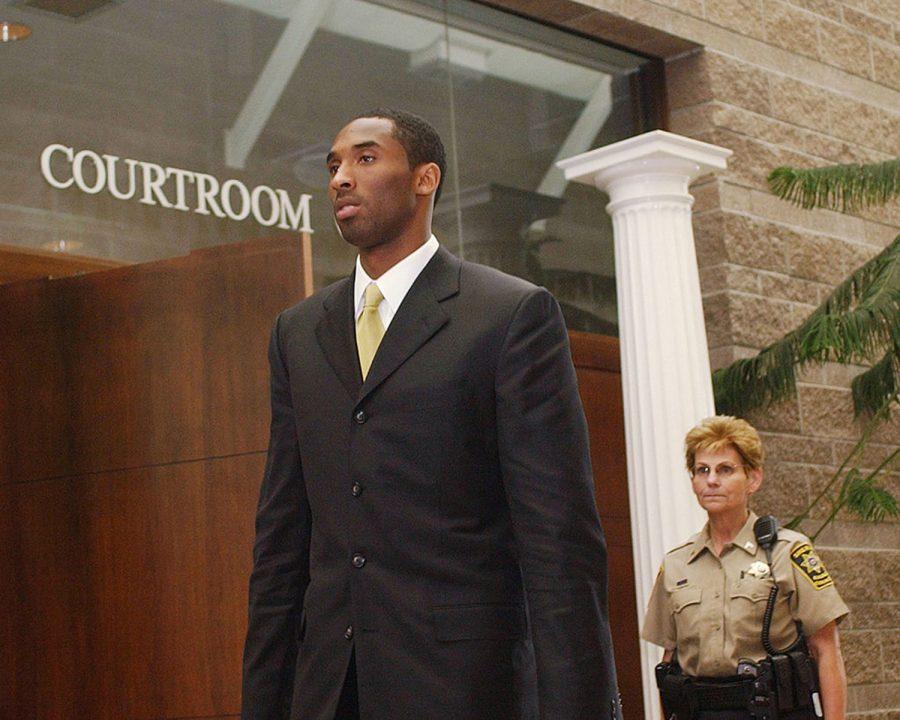Opinion | The Kobe Dilemma
Ed Andrieski-Pool/Getty Images/TNS
Los Angeles Lakers basketball player Kobe Bryant leaves the courtroom at the Eagle County Justice Center April 27, 2004, in Eagle, Colorado.
February 3, 2020
An emotional LeBron James stood center court at the Staples Center — “The House That Kobe Built” — addressing a mourning Laker Nation before tip-off Friday night against the Trailblazers. It was the first game since the fatal helicopter crash in Calabasas, California, that killed all nine people on board, among them Bryant and his 13-year-old daughter, Gianna.
“So in the words of Kobe Bryant, ‘Mamba out.’ But in the words of us, ‘Not forgotten.’ Live on brother.”
In a most abrupt and devastating ending, the curtain closed on the “Lake Show’s” perennial star at the age of 41. Bryant is remembered for reigning in a new era of basketball excellence, succeeding Michael Jordan as the face of the game for 20 years.
But among all of his remembered glory on the hardwood, there is an episode many people are conveniently omitting. When accusations of sexual violence are concerned, it shouldn’t matter how beloved Bryant was to his fans. His alleged actions must be acknowledged as a part of his murky legacy.
Bryant was arrested in 2003 on charges of sexual assault of a 19-year-old employee at the Lodge and Spa at Cordillera, a hotel in Edwards, Colorado — an encounter that would forever taint the legacy of the man soon to be posthumonously enshrined in the Basketball Hall of Fame.
In a statement issued to his attorney, Bryant believed the encounter to be consensual, but “after months of reviewing discovery, listening to her attorney, and even her testimony in person, I now understand how she feels that she did not consent to this encounter.”
Subjected to death threats and her identity leaked, the accuser decided against testifying, and as a result, the judge dropped the charges against Bryant. Instead she settled out of court. After a tearful press conference apology and a $4 million ring — seemingly by way of apology — for his wife, Bryant slowly began to recover from his disgraced reputation. His endorsements were reinstated and the Lakers gifted him a seven-year contract reportedly worth $136 million.
Though the sexual assault case against Bryant preceded the Me Too era, it would be expected that upon reviewing it with a fresher lens in 2020, the public and celebrites alike would disavow Bryant — not celebrate him.
For some odd reason, public opinion turns a blind eye or calls “believing all victims” into question when the accused are acclaimed and talented figures. Look no further than Roman Polanski, Michael Jackson and Cardi B, just to name a few.
So-called Hollywood progressives and socially conscious politicians championed Harvey Weinstein — whose sexual assault case is credited with kicking off the Me Too movement — and continued to work and socialize with him through the horrid rumors that spread about celebrity circles. So it was no surprise that when Kobe Bryant was awarded an Oscar in 2018 for his animated short film, his presence was not met with backlash, but rather celebration. Many women in attendance at the awards that year wore black dresses in solidarity with sexual assault victims, yet they were revering Bryant.
Granted, a presumption of innocence is a necessary principle in matters of sex crimes — it is possible for someone to be falsely accused. But why is Bryant being excused from scrutiny and doubt in the era of Me Too? If the consensus among us is to take alleged victims seriously, then it must be applied to everyone. Certainly there is a political implication in all this. Many in the left hold former President Bill Clinton in high esteem, and he is still a respected figure in the contemporary political sphere after multiple accusations of rape. The right is no different in its reverence for President Donald Trump and his alleged sexual misconduct.
It is all about sides. People are easily forgiving and willing to forgo their values if the accused is on the right team — their side. Sports are no different — just because the star athlete passed away doesn’t mean that his allegations should be ignored or pushed to the back.
Bryant’s accuser refuses to speak of him publicly following his death. Bryant undoubtedly inspired a generation of young athletes, and it is true that he used his celebrity to enrich the lives of the less fortunate through his various organizations. He was seemingly a loving and devoted father to his daughters, too, calling himself a “girl dad” who scoffed at the idea that he needed a son to continue his legacy. But using the good he did during his life as a defense is pointless. It doesn’t change the unresolved allegation of sexual assault.
Bryant’s daughter is innocent in all of this. The death of a child is earth-shattering, and Gianna’s, with all her potential, is especially tragic.
Yet another woman to consider is the one who will have to relive the incident — one which Bryant acknowledged had scarred her. The now-36-year-old will once again be subjected to the same slander as she did years ago because of who the accused was.
Whatever happened in that hotel room 17 years ago must be acknowledged, and, for that, the halo that has been placed above Bryant’s head by the public must be replaced with an asterisk. The “Black Mamba” may have been a legend on the court, but, off the court, he was still human.
Aidan is a junior majoring in English Writing with a certificate in Jewish Studies. He primarily writes about film and Judaism. Write to Aidan at [email protected]



